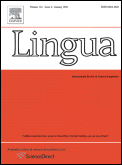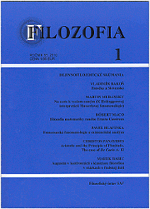
Centaurus. Journal of the European Society for the History of Science is a quarterly peer-reviewed, open-access academic journal. Centaurus publishes high quality academic content on the history of science in the broadest sense, including the history of mathematics, medicine, biomedical sciences, earth sciences, social sciences, humanities and technology, studied from different perspectives, including epistemic, social, cultural, material and technical aspects. It is the official journal of the European Society for the History of Science (ESHS).

Iranian Studies is a peer-reviewed academic journal covering Iranian and Persianate history, literature, and society published quarterly by Cambridge University Press on behalf of the Association for Iranian Studies. It was established in 1967 and up to 2021 was published 6 times a year by Routledge. The editor-in-chief is Nasrin Rahimieh.

Lingua: An International Review of General Linguistics is a peer-reviewed academic journal covering general linguistics that was established in 1949. It is published by Elsevier and the editor-in-chief is Marta Dynel.
Historical Records of Australian Science is a biannual peer-reviewed academic journal covering the history of science in Australia and the south-west Pacific and published by CSIRO Publishing on behalf of the Australian Academy of Science. It was established in 1966 as an irregular publication with the title Records of Australian Academy of Science, obtaining its current name in 1980. Since then, the journal has appeared annually and, since 1991, twice a year.

The Web of Science is a paid-access platform that provides access to multiple databases that provide reference and citation data from academic journals, conference proceedings, and other documents in various academic disciplines.

Synthese is a monthly peer-reviewed academic journal covering the epistemology, methodology, and philosophy of science, and related issues. The name Synthese finds its origin in the intentions of its founding editors: making explicit the supposed internal coherence between the different, highly specialised scientific disciplines. Jaakko Hintikka was editor-in-chief from 1965 to 2002. The current editors-in-chief are Otávio Bueno, Wiebe van der Hoek, and Kristie Miller.
Angelaki: Journal of the Theoretical Humanities is a bimonthly peer-reviewed academic journal that was established in 1993. It covers "work in the disciplinary fields of literary criticism and theory, continental philosophy, and cultural studies." Since 1998, it has been published by Routledge. The editor-in-chief is Pelagia Goulimari, who was also the founding executive editor. In 1996, Angelaki was named "Best New Journal" in the annual awards of the Council of Editors of Learned Journals.

The Journal of Zoological Systematics and Evolutionary Research is a peer-reviewed scientific journal published by Wiley-VCH in collaboration with Hindawi. It covers the systematic study of animal sciences, connected with evolutionary research. The journal was established in 1963 as the Zeitschrift für zoologische Systematik und Evolutionsforschung and published by Akademische Verlagsgesellschaft. It obtained its current title in 1994 when it was moved to Wiley-VCH.

Filozofia is an academic journal of philosophy published by the Slovak Academy of Sciences. It publishes articles in Slovak, Czech, and English. The journal's scope includes metaphysics, epistemology, history of philosophy, social philosophy, philosophy of mind, ethics, philosophy of religion, and related disciplines. The journal publishes 10 issues a year. The editor-in-chief is Jon Stewart.

Language Testing is a quarterly peer-reviewed academic journal covering language testing and assessment. Its editors-in-chief are Talia Isaacs and Xun Yan. It was established in 1984 and is published by SAGE Publications.
The International Journal of Applied Mathematics and Computer Science is a quarterly peer-reviewed scientific journal published since 1991 by the University of Zielona Góra in partnership with De Gruyter Poland and Lubuskie Scientific Society, under the auspices of the Committee on Automatic Control and Robotics of the Polish Academy of Sciences. The editor-in-chief is Józef Korbicz. The journal covers various fields related to control theory, applied mathematics, scientific computing, and computer science.
BMGN: Low Countries Historical Review is a peer-reviewed open-access academic journal covering the history of the Low Countries, which is taken to include the Netherlands and Belgium and their colonial and international involvements. It is published by the Royal Netherlands Historical Society, with articles appearing either in Dutch or in English. In June 2018 it was announced that Dirk Jan Wolffram would be taking over as chair of the editorial board.
The Journal of Social Philosophy is a quarterly peer-reviewed academic journal of social philosophy covering work of normative and practical significance concerning social and political life. It was established in 1970 by the North American Society for Social Philosophy and is published by John Wiley & Sons. The editor-in-chief is Carol Gould.
Atmospheric Measurement Techniques is a semi-monthly peer-reviewed open-access scientific journal covering research within atmospheric sciences. It was established in 2008 and is published by Copernicus Publications on behalf of the European Geosciences Union. The editors-in-chief are Hartwig Harder, Paolo Laj, Marloes Penning de Vries, Andreas Richter, and Rebecca Washenfelder.
Glossa: A Journal of General Linguistics is a peer-reviewed open access academic journal covering general linguistics. It was established in 2016. The journal is published by the Open Library of Humanities and the editors-in-chief are Johan Rooryck and Lyn Tieu
Humanities and Social Sciences Communications is a peer-reviewed open access academic journal published by Nature Portfolio. It covers all areas of the social sciences and humanities. It was established in 2014 as Palgrave Communications, obtaining its current name in 2020.
Intersecciones en Antropología is a biannual peer-reviewed open access academic journal established in 2000 and published by the Universidad Nacional del Centro de la Provincia de Buenos Aires. It covers work on archeology, bioarcheology, and related disciplines. The editor-in-chief is Mariela E. Gonzalez.

The Journal of Horticultural Sciences is a biannual peer-reviewed open-access scientific journal covering all branches of horticulture. It was established in 2006 and is published by the Society for Promotion of Horticulture. The journal contains review articles, research papers, and short communications. The editor-in-chief is Rajiv Kumar.
The Journal of Asian Architecture and Building Engineering is a bimonthly peer-reviewed open access academic journal published by Taylor & Francis on behalf of the Architectural Institute of Japan, the Architectural Institute of Korea and the Architectural Society of China. The editor-in-chief is Xilin Lu. It was established by the Architectural Institute of Japan in 1886.
Hegel-Studien is an annual German peer-reviewed academic journal focussing on the philosophy of Georg Wilhelm Friedrich Hegel. It was established in 1961 in cooperation with the Hegel Commission of the German Research Foundation and in close connection with the historical-critical edition of Hegel's Gesammelte Werke. The journal publishes articles predominantly in German, but also in English and French. It is published by Felix Meiner Verlag.








